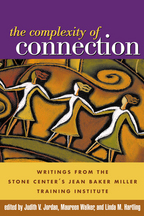The Complexity of Connection
Writings from the Stone Center's Jean Baker Miller Training Institute
Edited by Judith V. Jordan, Maureen Walker, and Linda M. Hartling
“In a culture toxic with aggression, competition, and 'power over' images, this book seeks to heal. Whether discussing race; isolation and loneliness; or raising caring, empathic sons, the authors write with authority and heart about important and deeply relevant issues. I cannot think of a book we need more in our sad, hard times.”
—Mary Pipher, PhD, author of Reviving Ophelia and Letters to a Young Therapist
“To encounter the transformative vision of the Stone Center in a single volume is always a special pleasure. The theoretical and clinical wisdom in this book is stunning in its power to change the reader in some fundamental way, and to move the field of psychotherapy toward a more accurate, compassionate, and multilayered understanding of what hurts and heals in human relationships.”
—Harriet Lerner, PhD, author of The Dance of Anger
“This is the book where the Stone Center theorists ask: 'What purpose and whose interests do psychological theories serve?' Refusing complicity with a culture of domination, they explore the complexity of human connection—its cultural contexts and therapeutic challenges. Readers will find an invitation to think about complicity and competition, especially among women, and also a guide to envisioning how connection can follow disconnection in families and at work as well as in therapy.”
—Carol Gilligan, PhD, author of The Birth of Pleasure
Table of Contents
IntroductionI. Deepening Our Understanding of Relationship
1. Toward Connection and Competence, Judith V. Jordan
2. Relational Resilience, Judith V. Jordan
3. Relational Awareness: Transforming Disconnection, Judith V. Jordan
4. Therapists' Authenticity, Jean Baker Miller, Judy V. Jordan, Irene P. Stiver, Maureen Walker, Janet Surrey, and Natalie S. Eldridge
5. Race, Self, and Society: Relational Challenges in a Culture of Disconnection, Maureen Walker
6. Shame and Humiliation: From Isolation to Relational Transformation, Linda M. Hartling, Wendy Rosen, Maureen Walker, and Judith V. Jordan
7. Racial Images and and Relational Possibilities, Maureen Walker and Jean Baker Miller
8. Women, Race, and Religion: A Dialogue of Black and White, Andrea Ayvazian and Beverly Daniel Tatum
II. Applying the Power of Connection
9. Couple Therapy: A Relational Approach, Stephen J. Bergman and Janet L. Surrey
10. Relationships in Groups: Connection, Resonance, and Paradox, Nikki Fedele
11. Mothers and Sons: Raising Relational Boys, Cate Dooley and Nikki Fedele
12. Applications of the Relational Model to Time-Limited Therapy, Judith V. Jordan, Maryellen Handel, Margarita Alvarez, and Robin Cook-Nobles
13. Relational Theory in the Workplace, Joyce K. Fletcher
About the Editors
Judith V. Jordan, PhD, is the codirector and a founding scholar of the Jean Baker Miller Training Institute (JBMTI) of the Stone Center at Wellesley College. Coauthor of Women's Growth in Connection and editor of Women's Growth in Diversity, she is an assistant professor at Harvard Medical School and works as a therapist, supervisor, and consultant.Maureen Walker, PhD, is a licensed psychologist with an independent practice in psychotherapy and multicultural consultation in Cambridge, Massachusetts. A faculty member and the director of program development at the JBMTI, she is the coeditor of How Connections Heal. She is also the associate director of MBA Support Services at Harvard Business School.
Linda M. Hartling, PhD, is the associate director of the JBMTI. She is also a member of an international team establishing the first Center for Human Dignity and Humiliation Studies.
Contributors
Margarita Alvarez, PhD, Department of Psychiatry, Harvard Medical School Cambridge, MAAndrea Ayvazian, PhD, School for Social Work, Smith College, and Communitas, Inc., Northampton, MA
Stephen J. Bergman, MD, PhD, Gender Relations Project, Stone Center at Wellesley College, Wellesley, MA, and Harvard Medical School, Cambridge, MA
Robin Cook-Nobles, EdD, Counseling Service at the Stone Center, Wellesley College, Wellesley, MA, and Antioch New England Graduate School, Keene, NH
Cate Dooley, MS, Jean Baker Miller Training Institute, Stone Center at Wellesley College, Wellesley, MA, and private practice, Newton, MA
Natalie S. Eldridge, PhD, Boston University Counseling Center, Boston, MA, and Jean Baker Miller Training Institute, Stone Center at Wellesley College, Wellesley, MA
Nikki M. Fedele, PhD, Jean Baker Miller Training Institute, Stone Center at Wellesley College, Wellesley, MA, and private practice, Wayland, MA
Joyce K. Fletcher, DBA, Department of Cooperative Education, Northeastern University, Boston, MA
Maryellen Handel, PhD, Tufts University School of Medicine, Boston, MA, and Behavior Health Network, Concord, NY
Linda Hartling, PhD, Jean Baker Miller Training Institute, Stone Center at Wellesley College, Wellesley, MA
Judith V. Jordan, PhD, Jean Baker Miller Training Institute, Stone Center at Wellesley College, Wellesley, MA, and Department of Psychology, Harvard Medical School, Cambridge, MA
Jean Baker Miller, MD, Jean Baker Miller Training Institute, Stone Center at Wellesley College, Wellesley, MA, and Department of Psychiatry, Boston University School of Medicine, Boston, MA
Wendy Rosen, PhD, McLean Hospital, Belmont, MA, and private practice, Cambridge, MA
Irene P. Stiver (deceased), PhD, Jean Baker Miller Training Institute, Stone Center at Wellesley College, Wellesley, MA; McLean Hospital, Belmont, MA; and Harvard Medical School, Cambridge, MA
Janet L. Surrey, PhD, Jean Baker Miller Training Institute, Stone Center at Wellesley College, Wellesley, MA, and McLean Hospital, Belmont, MA
Beverly Daniel Tatum, PhD, Spelman College, Atlanta, GA
Maureen Walker, PhD, Jean Baker Miller Training Institute, Stone Center at Wellesley College, Wellesley, MA, and private practice
